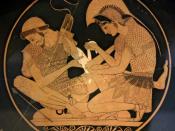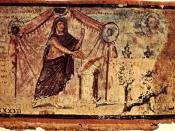Homer's Iliad is consistently classified as one of the greatest pieces of written art in the history of the world. That's saying a lot about considering the unfathomable amounts of literature that have been produced over the centuries by many, many very ingenious men and women. I don't disagree by any means, I whole heartedly concur that it is perhaps one of the greatest stories ever told. I do have a few slight problems about the poem though. Before I get into the themes and content of The Iliad, I'd like to point out a few discrepancies and fallacies surrounding it.
1. Homer, a blind poet, is traditionally given credit for the authorship of the Iliad along with The Odyssey, but odds are Homer was just a glorified scribe. Most scholars that have studied either epic poem agree that both were most likely passed down for numerous generations through oral tradition, constantly becoming embellished and added to, before they reached Homer.
2. Heinrich Schliemann supposedly discovered the ruins of Troy in the late nineteenth century, but archaeologists aren't even at agreement that Troy ever even existed, which would mean there was no Trojan War, which would mean "Homer's" epics might be no more than extremely long fairy tales for the amusement of the imagination instead of a history lesson of Greece.
3. The scholars that do on one level or another believe that there was a Troy and a Trojan War agree it took place in the 12th century B.C. but in the Homeric versions of the epics written of the war, the feudal social structure and the gods mentioned are from the 8th and 9th century. He also makes references in the story to iron tools and to tribes that had not yet migrated to Greece by the 12th...


